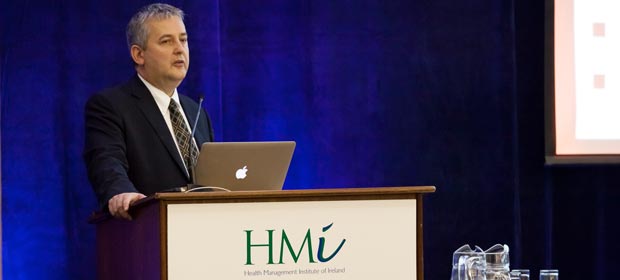We must identify and develop a pool of potential successors for senior management roles and we need to invest in our people to ensure they are equipped to implement the large scale change required to manage the transition in structures and services following the dissolution of the HSE, Mr. Bill Maher, Group Chief Executive, West/North West Hospital Group told the Conference.
There are now seven hospitals with over 1,700 beds and over 7,600 staff in the West/North West Hospital Group, Mr. Bill Maher, Group Chief Executive, told the Conference.

They includes one Level 4 hospital (University Hospital, Galway), four Level 3 hospitals (Portiuncula Hospital, Letterkenny General Hospital, Sligo Regional Hospital and Mayo General Hospital) and two Level 2 hospitals (Merlin Park Hospital and Roscommon Hospital).
UCG has 542 beds and 2,500 staff, Merlin Park has 66 beds and 517 staff, Roscommon has 63 beds and 278 staff, Portiuncula has 158 beds and 644 staff, Letterkenny has 318 beds and 1,367 staff, Sligo has 318 beds and 1,329 staff and Mayo has 306 beds and 985 staff.
Speaking on “Hospital Groups: Vision, Values and Performance, he said that the new model of healthcare was results driven. It was based on groups of hospitals, the National Clinical Programmes, local accountability/empowerment, national standards and Money Follows The Patient.
Many leadership models existed and people should pick the one which worked for them
“We need to ensure that money follows the patient. If we were paid for the activity we delivered, we would be talking about investment programmes and not cost containment programmes.”
Mr. Maher said that many leadership models existed and people should pick the one which worked for them.
“Leadership is important and gets results. My personal view is that leaders are developed and not born. Staff are our greatest asset and we should never forget this.
“Maintaining staff skill level and morale in current climate is difficult but essential.
Providing senior management continuity is critical to stability and business success in the complex mix of medical, professional, social and political challenges. We must identify and develop a pool of potential successors for senior management roles. We need to invest in our people to ensure they are equipped to implement the large scale change required to manage the transition in structures and services following the dissolution of the HSE.”
A psychological contract is a model/philosophy to guide us in the way we structure and manage organisations and deal with our employees
“Recruit the best, spot the talent, train them and grow them, he advised.
He said that there had been 802 internal training events for staff in the Group delivered in 2012, an increase of 138 over 2011. There were 6,445 staff attendances, 65 staff received support for academic courses and 531 staff attended seminars and conferences in 2012.
Mr. Maher said there were different types of leadership. Directive Leadership or telling staff what to do was more traditional, more familiar and was short term, although it could be very successful.
However, it had to be asked if it delivered sustainable growth and if other leadership approaches were needed.
Different leadership approaches included:
“Telling” leadership, characterised by one-way communication, where the leader defined the role of the individual and provided the what, how, why, when and where to do the tasks.
“Selling” leadership where while the leader was still reviewing the direction they were now using two-way communication and providing the socio-emotional support that would allow the individual being influenced to buy into the process.
“Participating” leadership which involved shared decision making about aspects of how the task was accomplished, where the leader was providing less task behaviours while maintaining high relationship behaviour.
“Delegating” leadership, where the leader was still involved in decisions, however the process and responsibility had been passed to the individual and the leader stayed involved to monitor progress
He said no one style was considered optimal for leaders to use all the time. Effective leaders were flexible and must adapt themselves according to the situation. He suggested that leaders should give people the tools to do the job, then keep out of their way as far as possible.
Mr. Maher said the psychological contact was an important tool. “A psychological contract is a model/philosophy to guide us in the way we structure and manage organisations and deal with our employees. It refers to the relationship between an employer and its employees and specifically concerns mutual expectations of inputs and outcomes.”
One of a number of definitions of the psychological contract states that it is “an implicit exchange between individuals and their organisation which specified what each expects to give and receive from each other in their relationship.”He said effective leaders understood that the psychological contract was important because it linked the individual to the organisation. They ensured that mutual expectations were both understood and fulfilled and the employee/employer relationship was carefully maintained. “It is core to the success of our Group.”
Their communications strategy was also a critical component. It included a website, town hall meetings, and Oireachtas briefings, Board meetings held in public, staff engagement surveys and “management by walking about.”

